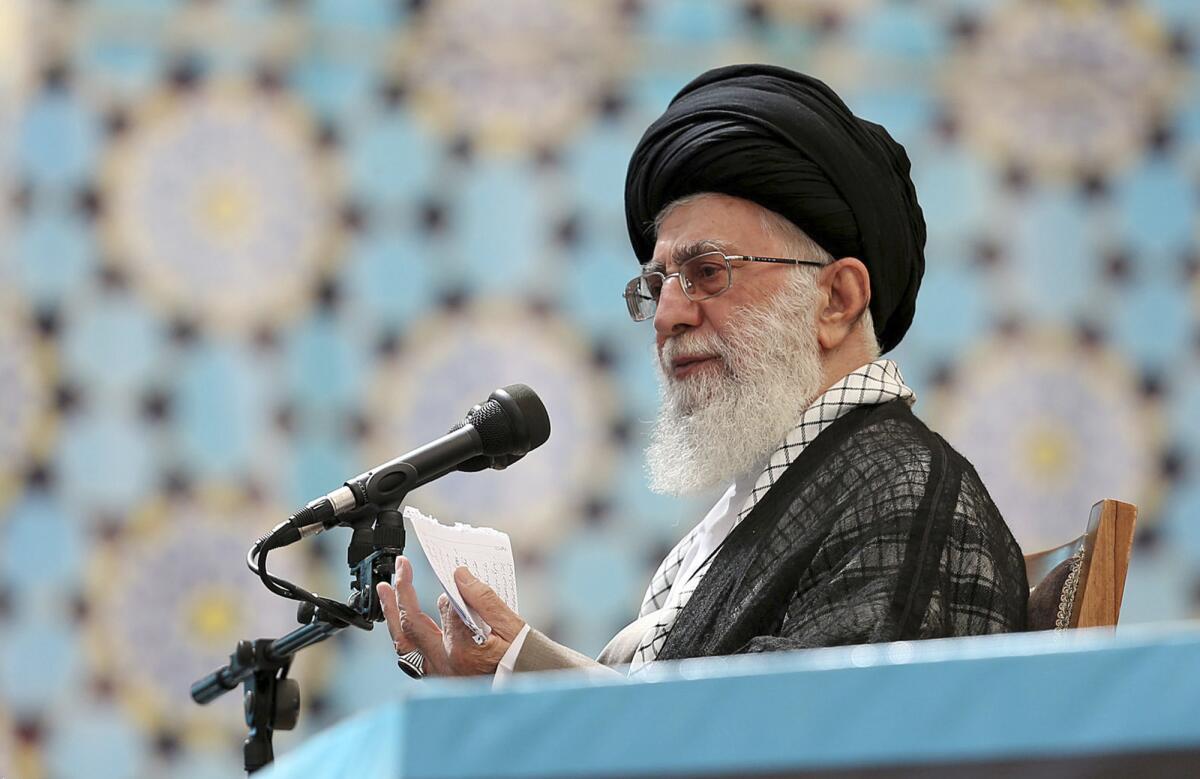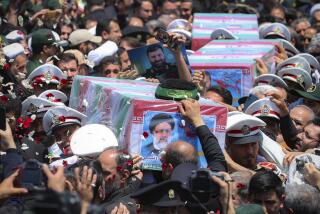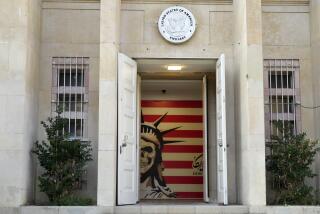Iran marks 25th anniversary of Ayatollah Khomeini’s death, knocks U.S.

Reporting from Tehran — Iran’s top cleric commemorated the 25th anniversary of the death of his predecessor, Ayatollah Ruhollah Khomeini, on Wednesday with a fiery anti-American speech that said the United States had failed in an effort to bring Iran “to its knees.”
“Despite the sanctions imposed upon it, Iran today is launching satellites and sending live organisms into space and is producing nuclear power,” declared Supreme Leader Ayatollah Ali Khamenei as he paid tribute to the spiritual leader who spearheaded the 1979 revolution.
Khomeini led the effort to overthrow the U.S.-backed Shah of Iran and is considered the founder of the Islamic Republic. He used the term “Great Satan” to refer to the United States.
The anniversary of his death, a solemn occasion in Iran, witnessed the gathering of tens of thousands of people to pay tribute at Khomeini’s mausoleum on the outskirts of the capital, Tehran. Many had made the long trek from other provinces on bicycles or even on foot.
All flights into and out of Tehran’s eight airports were also stopped.
Khomeini’s June 4, 1989 death was overshadowed in much of the world by the Chinese assault on pro-democracy protesters in Tiananmen Square, which dominated international news for days.
His successor, Khamenei, struck a defiant tone in his almost hour-long speech, delivered at the mausoleum to a hand-picked audience under tight security. He accused the West of launching “the largest political, economic, and military attacks on Iran’s religious democracy” beginning in 1979. Despite that, he said, Iran “keeps advancing.”
According to Khamenei’s Twitter account, which featured a live update of his speech, he credited the advance to an “Islamic Awakening.” Khamenei said Western intelligence agencies may “report to their chiefs that they were able to suppress the Islamic Awakening,” but it will “undoubtedly rise up again over time and will continue.”
He accused the United States of classifying the world’s countries into three groups: those that blindly agree with U.S. policy; those, such as European countries, that are tolerated by the United States but are betrayed when the need arises; and countries that do not fall under U.S. influence, such as Iran.
“That’s why we see [America] employing all kinds of methods against such countries in an attempt to bend them to its will, either through a military attack or a coup or other methods,” he concluded, adding that European countries were making a strategic mistake in following the U.S.
Set against a backdrop of the fast-approaching July deadline for a deal between Iran and the so-called “P5+1” countries (the United States, Russia, China, France, Britain, and Germany) regarding Iran’s nuclear capability, Khamenei’s bellicose speech was seen by some analysts as a piece of political theater, with the religious leader taking on the role of the “bad cop” to President Hassan Rouhani’s “good cop.”
“President Rouhani can say to the U.S. and its allies, ‘Look, in Iran we have such a firebrand leader. If you are too tough with us in talks, then you have to deal with the supreme leader and his ilk,’” said a Tehran-based commentator who refused to be named for security reasons.
Others viewed the deal as a reminder that it was business as usual between Iran and the United States, whose relations have ranged from cool to openly hostile since the revolution and Iran’s subsequent takeover of the U.S. embassy, leading to the holding of more than 60 Americans hostage for 444 days.
“Khamenei wanted today to remind the U.S.A and other powers that any deal with P5+1 over nuclear issue does not mean any compromises with the U.S. and its allies in the aftermath of the deal,” said Nader Karimi Juni, chief editor of the Jahan-e Sanat (World of Industry) newspaper. “Iran remains as it has been in the past 35 years — the enemy of the U.S., and the U.S. is and will be the enemy of Iran.”
Special correspondents Mostighim and Bulos reported from Tehran and Beirut, respectively
More to Read
Sign up for Essential California
The most important California stories and recommendations in your inbox every morning.
You may occasionally receive promotional content from the Los Angeles Times.











